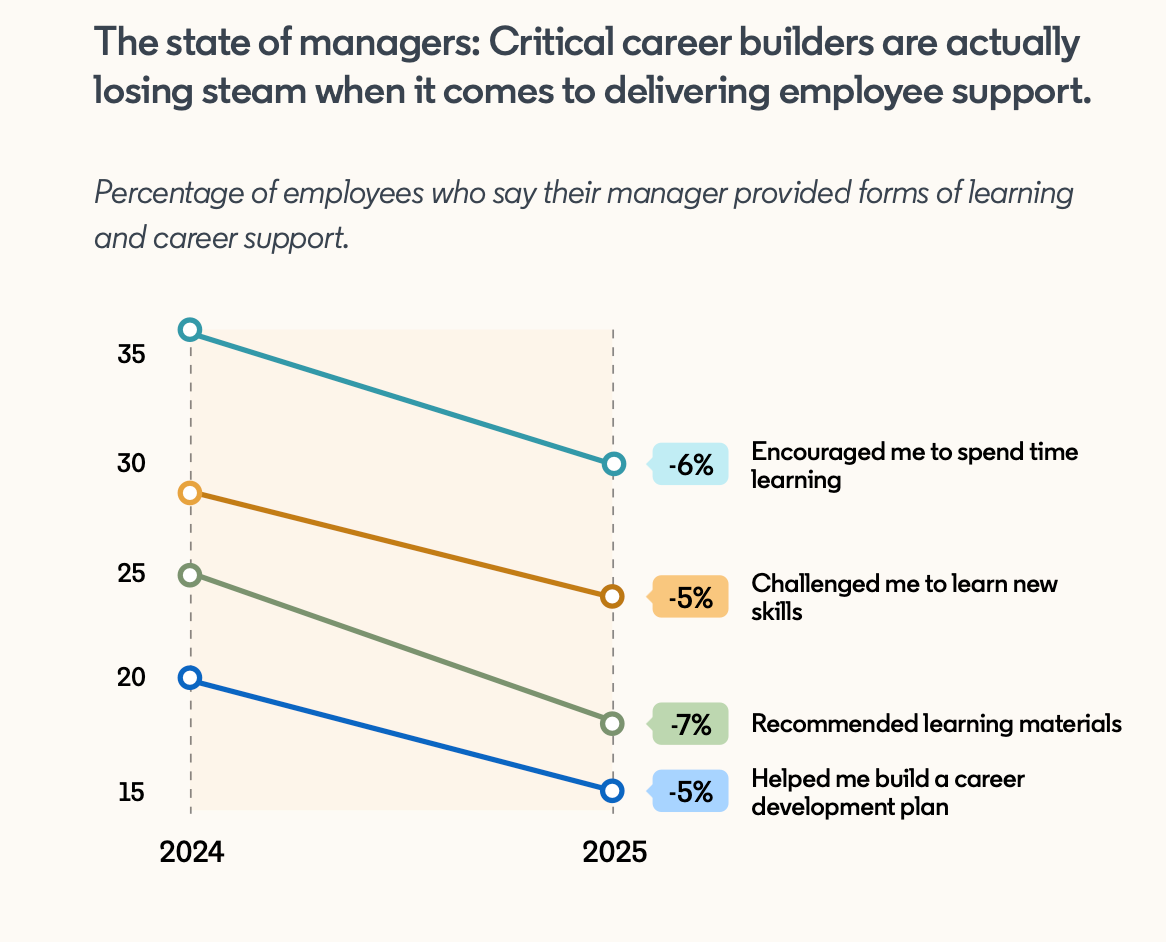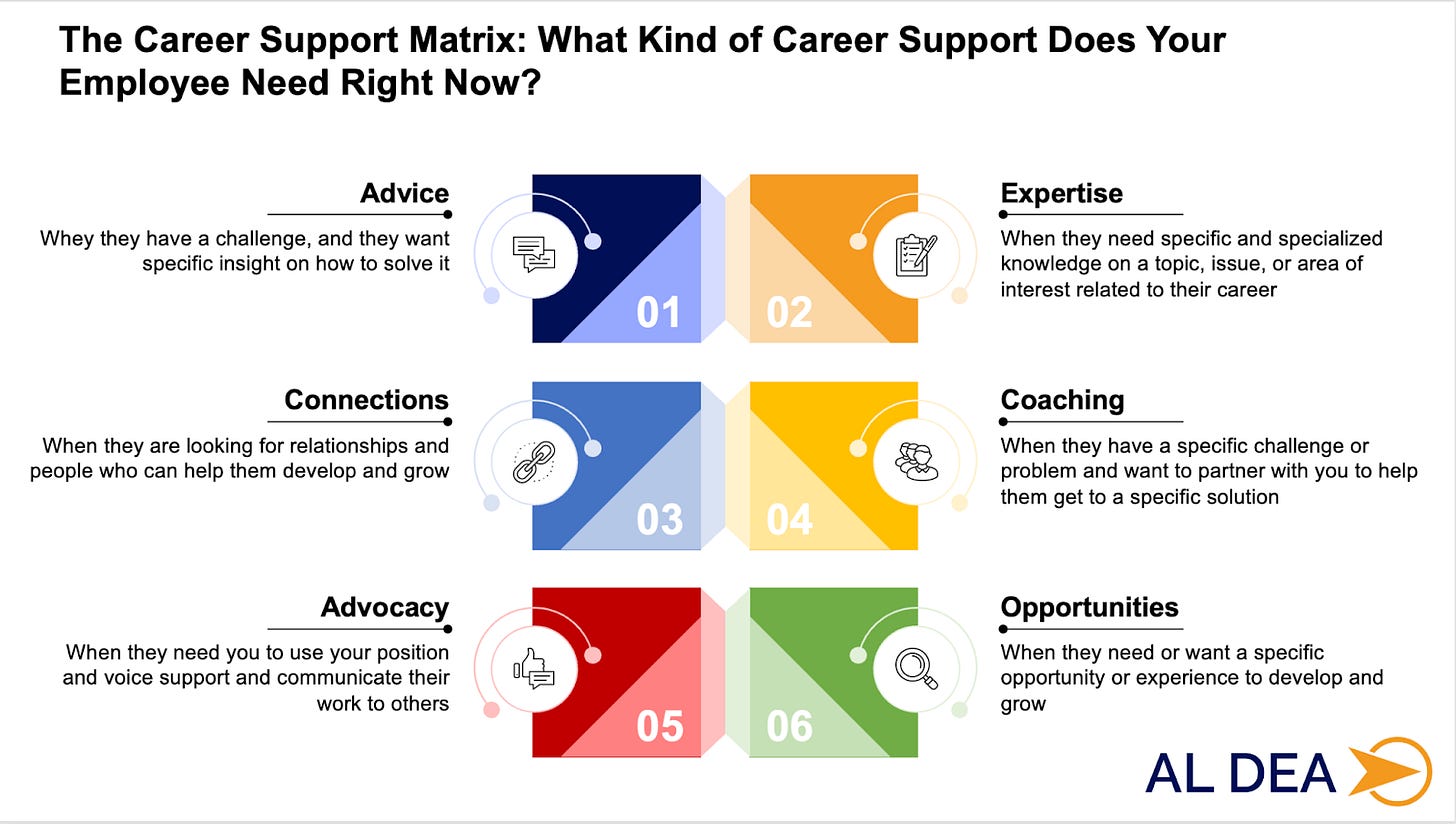How Managers Can Become Career Development Champions
More insights on the LinkedIn 2025 Workplace Learning Report
This week, Linkedin released its 2025 Linkedin Workplace Learning Report (download here) I had a chance to share my thoughts which are in the report (you can find my quotes if you read it) but in the report it highlighted a number of key trends.
One of the biggest takeaways was a theme around the emergence of 𝗖𝗮𝗿𝗲𝗲𝗿 𝗗𝗲𝘃𝗲𝗹𝗼𝗽𝗺𝗲𝗻𝘁 𝗖𝗵𝗮𝗺𝗽𝗶𝗼𝗻𝘀—organizations that prioritize career-driven learning and outperform their peers.
By analyzing Linkedin data across a number of indices across their platform, LinkedIn was able to develop a Career Development Index and separate out the leaders from the laggards, which they are calling Career Development Champions. As you can see from the charts below, Career Development champions invest more in career development but based on their research also perform better against key business metrics.
While the rest of the report is worth reading, there was one data point I did want to zero in on, and that is the lack of manager support in employee career development, based on their data.
If you’ve been reading this newsletter for awhile you’ll know that this is something that I’ve written about for the past few years (here, here, here, and here)
As you can see in the graph below, it turns out the data this year is pretty bleak in terms of manager support for career development.
The numbers are pretty bleak, and in my post someone asked about why they are so bad. I have a few thoughts and ideas, but if you have them I’d love to hear them.
How Managers Can Become Career Development Champions
The good news is that, while the numbers do look bleak, in my experience managers do have a lot at their disposal in terms of actions and methods to encourage and support their employees’ career development. While it absolutely does take a matter of both skill and will, these are things that can be learned, taught and practiced, and over time, done well.
The benefit of investing in this is that you become a manager or leader that people want to work for, you support the development of your employees (which can help your own team) and that in many cases, other employees will want to work for you and you’ll retain employees longer. It is an investment of time, but one in my opinion that pays off.
Naturally, a question comes up around “how do I do this?” Over the years, I’ve developed processes, tools around this and I want to share one of my favorites.
Introducing The Career Support Matrix
A concept I often teach in my leadership programs specifically to managers is around the Career Support Matrix. The idea behind this is that while managers and leaders cannot do everything to support their employee career development, there is a lot they can do.
Based on my work over the last decade around helping leaders support employee career development, I’ve found that there are six common ways a manager can help an employee with their career (and six ways employees need help in a way that a manager can support them.)
They are below:
Advice: Whey they have a challenge, and they want specific insight on how to solve it
Expertise: When they need specific and specialized knowledge on a topic, issue, or area of interest related to their career
Connections: When they are looking for relationships and people who can help them develop and grow
Coaching: When they have a specific challenge or problem and want to partner with you to help them get to a specific solution
Advocacy: When they need you to use your position and voice support and communicate their work to others
Opportunities: When they need or want a specific opportunity or experience to develop and grow
(Note: Even if you are not a manager, you can also use this, as a way to ask your manager/leader for help in your career, which is also why I like this method)
Depending on the person as well as your confidence in your abilities as a manager, there are probably elements of the matrix that you are pretty comfortable with, and other ones that you might not be comfortable with. That is okay, and expected. But for the ones that you are comfortable with, there are also probably actions you can take, if your employee needs that help, to help them in their career. As an example, if your employee shares with you that they are looking for connections, an action you could take is to connect them with people you know who mirror who they are looking for. And certainly, advocacy, and using your power and voice to speak up on their behalf is something that every manager can do. If for some reason yo aren’t comfortable with one of these that is your invitation if they ask for help to find someone else who can help them. Remember: that is also a form of support!
How to use this
Naturally, you’re probably wondering how do I action on this or what is the best way to put this into practice. I would recommend something like this:
Setup a chance to chat with your employee - pretty straight forward, but give them a proactive heads up that you’d like to chat about how you can support their career development and growth, and encourage them to come with any thoughts or ideas. Remind them it’s not set in stone, and it is meant to be a collaborative discussion
Ask them the question: What kind of support do you need right now? - This is the magic question that helps unlock the Career Support Matrix. Naturally, they will either answer and share with you what they need (you can respond based on that) but sometimes, they may not know how to answer the question, and that’s where the Career Support Matrix comes into play
Share with them that there are many ways that you as a leader can support their career growth, depending on their specific need/request for help. You can then share a few examples of the Career Support Matrix, just to see if any of those resonate. In my experience, if you’ve made it this far, and you end up sharing at least 2-3 of the elements of the matrix, eventually it clicks for the employee about what they want to ask for.
Something I’ve also found is that at least initially, many employees struggle to answer the question “what kind of help do you need.” This isn’t because they don’t know it's mostly because they don’t always have the specific language for what they want to ask or say, and in many cases, don’t actually know that is something that they can ask for.
But this is also why this method can be so helpful - Telling your employees that they can ask for advice, expertise and coaching depending on what they are looking for in the moment can be a very empowering and expansive thing. Furthermore, once you and your employees learn this language, it makes it much easier to consistently have this conversation, and in many cases, eventually your employees may come proactively to you in the future asking for support.
Small Habits and Practices Add up Over Time
Supporting your employee’s career development is not a once a year thing. But it also doesn’t have to be a huge lift of energy and time. Instead, small habits and practices (like using the Career Support Matrix) done well consistently and over time, not only help your employees but help you gain more awareness of how to best utilize your employees based on their strengths and career development.
If you’re looking for some help for your learning and development, leadership development, I’d love to work with you: Here is how I might be able to assist:
Leadership & Learning Programs: Formal training and leadership development in your company, such as new manager or new leader training, or skill-based programs. (See Here for more details)
Keynote Speaking - Do you have a conference, offsite, or event and in need of a speaker? I’d love to hear more and see how I can assist
1:1 Executive Coaching - Are you looking for an executive coach for 1:1 leadership support? Let’s chat about how we can work together
Feel free to contact me directly for more details!






